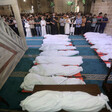The Electronic Intifada 13 October 2023

Vast numbers of people have been displaced by Israel’s latest attack on Gaza.
APA imagesA loud noise pushed me off my bed. I ran toward the nearest window to see what was happening.
Dozens of rockets were flying through the sky. I looked at my phone. And I read that the siege of Gaza had been broken.
This was mind-blowing news.
A short while ago I was asleep. Now my eyes were wide open.
Gaza has long been under a blockade: by land, air and sea. Now it was free!
We, the people of Gaza, believe that territories occupied since 1948 – territories the world now calls “Israel” – will be free. But no one had imagined that day could be near.
The feeling of euphoria was fleeting.
I was certain that the entire Gaza Strip would pay a high price for these events.
A few hours later, the Israeli Prime Minister Benjamin Netanyahu, declared, “We are at war.” He told Gazans to “leave now.”
I started to wonder: Where do we go?
We are trapped.
Thousands of people tried to flee. They gathered at the Rafah crossing, which separates Gaza and Egypt.
The crossing was closed. Egypt sent troops to its border.
And despite how Netanyahu told the people of Gaza to “leave now,” Israel started bombing people in Rafah. People who were indeed trying to leave.
A few hours later, Israel began attacking residential buildings. Some of the towers targeted had offices for media firms.
Soon, Israel was bombing mosques, main streets, schools, hospitals.
The Palestine Tower was one of the buildings that was destroyed. It housed 82 families.
In August 2022, the same tower was also targeted by Israel.
Khalil, a father of four, told me that he wants to leave Gaza for any country that will accept him and his family.
“There’s no reason to target the tower,” he said. “We’re in a quiet residential area.”
“They want us to be homeless and without a place to stay,” Khalil added. “I’m worried about my mother, who is 82 years old. We’re completely exhausted.”
Hundreds of thousands of people have been displaced as a result of the bombing of other residential towers. They have taken up residence in relatives’ homes, schools run by the UN agency for Palestine refugees (UNRWA), empty shops, hospitals.
Terrible news
When Israel attacks us it is vital to answer phone calls.
The call could be a warning from Israel that you must evacuate your home within minutes.
Or it could be people asking to shelter in your home.
Or it could be someone phoning with terrible news.
On the second day of Israel’s bombardment, I answered my phone with one hand. My other hand was pressed to my pounding heart.
The call was from my aunt. “Sabre has been killed,” she told me in a tearful voice.
Sabre was my cousin. He was a funny guy and had been in excellent spirits lately as he had just bought a flat.
Now, he was dead because of an Israeli airstrike.
I wiped away my tears and set out to pay my respects to Sabre. I reflected on our shared memories as I walked.
When I saw Sabre’s 3-year-old son playing, I felt helpless. He did not know that he will grow up without his father.
The Arabic word for “dad” is “baba.” This child now has nobody to call “baba.”
Desperate measures
The situation in Gaza has never been as bad.
We are in darkness. Electricity has been cut. We have very little internet access.
Telecommunication firms have been targeted, so mobile phones are failing us.
Many buildings have been bombed, without their inhabitants being given a warning.
The Israeli defense minister has said “we are fighting human animals.”
Israel is committing genocide against a silenced people.
It has been extremely hard for me to work as a journalist. I have to find somewhere that has an internet connection, so that I can send material to news outlets.
We hear bombings and the sound of warplanes constantly.
Yet we have few sources of information, other than the radio.
Haya, my sister, has had to flee her home, along with her husband and two children. They live in al-Rimal, a neighborhood of Gaza City.
After receiving a threat, Haya rushed to my family’s house, about a kilometer away. They had nowhere else to stay.
Her husband looked very pale as they entered the house. My mother and I went to make them coffee, trying to calm them down.
Just then, we saw the sky go red from the kitchen window. My mother got down on the floor.
The bombs fell some distance away but the experience was deeply unsettling. My hands were shaking as I carried the tray with the coffee.
My father – actually, most fathers in Gaza – believes that the middle of the house is the safest place to be.
Now, there were 20 of us gathered in the same part of the house.
“We’ll all be killed,” Haya thought aloud.
We tried to calm her down and discuss such pressing issues as where to go if there is a bombing nearby.
Who will carry the children?
What should we do if we have to split into more than one group?
When there is a bombardment, we try to convince children that there is a party going on. We try to dance with them, to smile as tears flow from our tired eyes.
But these desperate measures are ineffective.
There is no justice when childhoods are destroyed by airstrikes.
“Why do they hate and want to kill me?” my 4-year-old nephew Kareem asked. “If I hold my toys tightly in my hand, will they come to heaven with me when I die?”
We keep on telling stories in our house.
Stories that must be told.
Ahmed Dremly is a Gaza-based journalist and translator.







